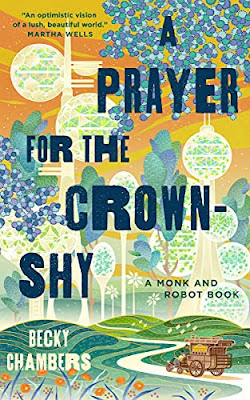Book links: Amazon, Goodreads
AUTHOR INFO: Becky Chambers was raised in California as the progeny of an astrobiology educator, an aerospace engineer, and an Apollo-era rocket scientist. Her first novel, The Long Way to a Small, Angry Planet, was originally funded via Kickstarter in 2012. Her books have been nominated for the Kitschies Award, the Hugo Award, the Locus Award, the Arthus C. Clarke Award and the Women's Prize for Fiction, among others, and won the Prix Julia Verlanger.
After living in Scotland and Iceland, Becky is now back in her home state, where she lives with her spouse. She is a devotee of video and tabletop games, and enjoys spending time in nature. She hopes to see Earth from orbit one day.
Publisher: Tordotcom (July 12, 2022) Page count: 152 Formats: ebook, paperback, audiobook
I started my review of A Psalm for the Wild-Built by stating that Becky Chambers had managed to incorporate many existential discussions in what has become a comfort read to me. This sequel does everything I would expect the next book to do, and somehow does it almost as well, if not more than the former.
This book follows the interactions between Dex(they/them) and Mosscap, as they journey together through Panga, to help Mosscap discover the answer to the question that prompted him to get in touch with humanity: What do humans want?
This book proves to be as much a journey for the reader, as it is for the characters. As Dex and Mosscap travel to different places in Panga, we watch Mosscap learn about the human world with such child-like curiosity that it is almost hard to believe it is a robot.
"You don't have to worry about that.""Why not?"Dex smiled reassuringly. "Because I'll be with you the whole way."
The symbiotic relationship that existed between Dex and Mosscap is shown to have grown to the level of caring companionship in this book, and the pacing of the book ensures an organic increase in the level of comfort they share. There are various endearing interactions between Dex and Mosscap to convincingly show their fondness for each other, as well as those when they are shown to be rather protective of each other. In my opinion, the author has accomplished the portrayal of a relationship where they adequately complement each other.
"It's one thing to be told about the world as it was." Dex said. "It's another to see a piece of it."
The pacing is just on point, with the book structured in a way that each chapter takes Dex and Mosscap to a new part of the world. This way, the book contains more worldbuilding than the previous one, and exposes the reader to humanity's utopic existence, and has tiny moments that show Mosscap's fascination and adoption of human inventions and societal norms.
"You don't have to have a reason to be tired. You don't have to earn rest or comfort. You're allowed to just be."
Through Dex's point of view, the book addresses the idea of burnout and the importance of taking a break, whether one thinks it well-deserved or not, in order to keep discontent at bay. As the two characters journey through different parts of Panga, they also grow with respect to the way they deal with their share of existential concerns, as they realise that they have to start with baby steps to answer the smaller questions for their present satisfaction, rather than debating about the bigger things that might not be answered with immediacy.
There is, however, one thing you might want to keep in mind before you pick this up. This is not the kind of book to deliver twists and turns, or focus on what the human condition could've been in a particular setting. It is purely one that shows a society in which almost all are good and pure, and stresses on the fact that a member of a society needn't purely be valued based on specific and regular contributions.
If you loved book one, I know you will pick up book two. This is another hug in the form of a book. I smiled at Mosscap's attempts at understanding human culture, took pride at Dex's urge to to care for Mosscap, and most of all, savoured the wonderfully depicted growth of their relationship. If you haven't picked either up, just know that both of them try to discuss one of the most existential questions for a species, while being equally comforting for a singular member of the same, and that you couldn’t possibly go wrong with your purchase.


No comments:
Post a Comment